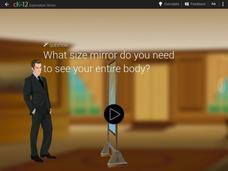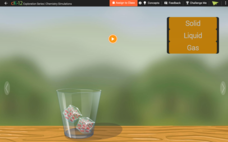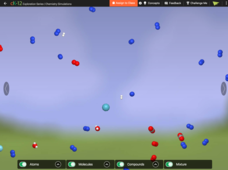CK-12 Foundation
Bow and Arrow
Where does the energy of an arrow come from? Is it from the person, the bow, or somewhere else? A simulation allows scholars to adjust the stretch distance and the elastic constant in order to understand where the energy comes from, what...
CK-12 Foundation
Cliff Diver
Cliff diving is more than an adrenaline rush ... it's a lesson in physics! Scholars adjust the height of a cliff and plot the resulting velocity and position over time on graphs. They also can incorporate air resistance to monitor the...
CK-12 Foundation
Prom Night
Create the perfect prom night image using the Law of Reflection! An interactive lesson explores angles of reflection when looking in a full-length mirror. Learners change the distance from the mirror and length of the mirror and watch...
CK-12 Foundation
Fish vs. Rose
Examine the science behind rates of diffusion. The video lesson and following interactive activity focus on the molecular components of different smells. Learners monitor the diffusion of each smell as they 'race' through a room.
CK-12 Foundation
What's the Matter?
What makes ice, water, and steam different? Their molecular arrangements are the same, but their movements are different. Individuals make this conclusion by completing the simulation activity.
CK-12 Foundation
It's Just a Phase
Explore the phases of water as temperature rises. Pupils consider the idea that temperature remains constant during each phase change. An interactive exercise allows your young scientists to observe the temperature and molecular motion...
CK-12 Foundation
Air Matters
What makes up the air we breathe? Young scientists explore the atoms and molecules in the air. An interactive lesson allows individuals to watch the movement of the particles in the air and change the makeup from a mixture to a compound....
CK-12 Foundation
Don't Slip
Salt is the go-to material when people need to melt ice—learn the chemistry behind its effectiveness with an interactive lesson. Pupils watch a short narrative and then explore the concept through a simulation. Young scientists...
CK-12 Foundation
Balancing Equations
Make the microscopic world of chemical reactions come to life. An engaging video demonstrates a methane-oxygen reaction. Learners see the reaction take place and observe the chemical equation being balanced.
CK-12 Foundation
Hotpack - Coldpack
Chemistry can help athletes and others protect and treat injuries. Use the interactive activity to explore the chemical reactions in instant hot and coldpacks. Learners manipulate the type of salt in the pack and watch the reaction take...
CK-12 Foundation
Crash
Explore the chemistry behind the airbags that keep you safe in a collision. Using a simulation, your classes find the best gas to use to inflate an airbag. The simulation shows the time it takes to inflate to a maximum volume....
CK-12 Foundation
Going Fishing
Why do some things float and others sink? A creative simulation allows learners to adjust mass and volume of an object to affect its buoyancy in water. A graph records the effect of each manipulation.
Mr. Nussbaum
French and Indian War
Scholars read a short information text about the French and Indian War, then answer 10 multiple-choice questions. A score sheet appears when all the questions have been answered.
Mr. Nussbaum
Christopher Columbus
A short informative text features the European explorer, Christopher Columbus. Scholars read or listen to the text then answer ten fill-in-the-blank and multiple-choice questions.
Perkins School for the Blind
Please Call Me Names!
Teaching students who are blind means teaching them skills a sighted person may take for granted. To practice calling people and objects by name, learners engage in a cueing activity. The child calls for an adult by name, and then uses a...
















